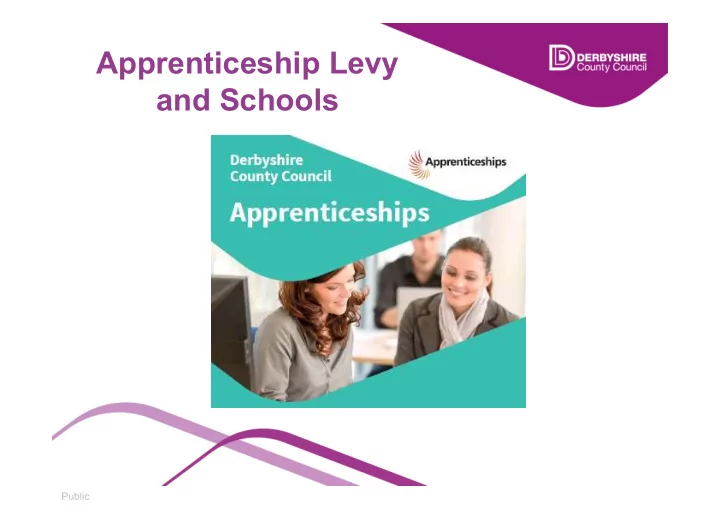

Apprenticeship Levy and Schools Public
Introduced on 6 th April 2017 • • An employer, with an annual pay bill of more than £3 million will be charged 0.5% of the element of their pay bill that exceeds £3m. • Local Authority (LA) Maintained and voluntary controlled schools are required to pay the levy as the council is the employer. Each school will have their contribution of 0.5% of the total pay bill allocated against their budget on a monthly basis. • All other schools will only be required to pay the levy where they have an annual pay bill of more than £3 million or where they are part of a multi-academy trust that has such a pay bill. Public
The Levy can be used towards training and assessments for apprentices It cannot be used to pay the apprentice Public
Apprenticeships for New Staff DACES support the recruitment of new apprentices for schools by: • assisting in creating the advertisement for your vacancy • placing the vacancy on the Find an Apprenticeship website • screening the applicants • assessing the screened applicants in English, maths and ICT skills and pre interviewing the candidates • packaging up and sending all the information to your school for final shortlisting Public
Apprenticeships for Existing Staff • This opportunity will allow the apprentice to gain wider employment experience and can represent an upskilling opportunity. • The apprentice will benefit from developing significant new knowledge and skills • The apprentice gains this through a wide mix of learning in the workplace, formal off-the-job training and the opportunity to practise new skills within their working time • The apprenticeship is matched with one of the existing approved frameworks or new standards. • The minimum duration of each apprenticeship is based on the apprentice working 30 hours a week or more for at least 12 months Public
Process: Discussion/Appraisal Identify needs Identify apprenticeship with the support of DACES Complete template/business case Submit for HR approval Recruit/enrol once approved Public
Which apprenticeship is right for my school? L7 L7 Senior Senior L4 School L4 School Leader Leader Business Business Professional Professional L3 L3 Team Team Leader Leader L6 L6 Teacher Teacher L3 L3 Mentor Mentor Public
Contracts – New Staff There are no age restrictions on applying for an apprenticeship. The council pays the National Minimum Wage for Age to apprentices. New apprentices are employed on a Fixed Term Contract (FTC) for the duration of their apprenticeship. No obligation for continuation of contract after completion of the apprenticeship. Contracts must be a minimum of 12 months based on 30 hours per week. Protected against redundancies for the duration of their contract. Public
Contracts – Existing Staff There are no age restrictions on applying for an apprenticeship. Stay on the same salary grade and progress up the grade as normal. Continue on their existing contract. No additional protection in relation to redundancies, restructures and other procedures. Public
Examples: The length of an apprenticeship depends on the level and hours per week. A level 2 apprenticeship would normally be for 15 -24 months based on 30 hours per week. Due to schools being open approximately 39 weeks of the year, we increase the length of the apprenticeship. • Business Admin L2 – 30 hpw - 15 month contract • STLS L3 – 30 hpw - 24 month contract If an apprentice is contracted less than 30 hpw the length of the contract would be increased accordingly. • Business Admin L2 – 15 hpw - 30 month contract Public
A Cluster Approach • Work collaboratively across the cluster sharing one apprentice • One school would be the lead school and others would be charged for % of salary Public
Off the Job 20% off-the-job training must: • be planned, reviewed and evaluated jointly between the apprentice, employer and assessor/mentor. • be delivered during contracted working hours • be delivered through one or more of the following methods: – The teaching of theory (for example, lectures, role playing, simulation exercises, online learning, manufacturer training) – Practical training; shadowing; mentoring; industry visits and attendance at competitions – Learning support and time spent writing assessments/assignments – Individual and group teaching – E-learning – Distance learning – Coaching – Mentoring – Feedback and assessment – Collaborative/networked learning with peers – Guided study – Induction Public
Off the Job…it’s not! The off-the-job training must be directly relevant to the apprenticeship framework or standard. OJT can include a number of activities and can take place on or off the employer’s normal work premises . To reiterate, where the training takes place isn’t of consequence, as long as it meets the government’s definition of imparting new skills, competencies and behaviours. Examples: • Paediatric first aid, safeguarding training etc. • Exploring resources, books and ideas banks • Lunchtime supervision • Time spent with SENTA, SENCO • Attending an ICT class at a centre • Attending a skill workshop at a centre • Portfolio work • Spending time in other classes across the school or even in other schools, to see the variety of practice • Teacher's PPA time • Mentoring • Shadowing staff in different roles • Staff meetings with training • Inset days • CPD Public
What Can Apprenticeships Do For Us? • “Our apprentices make a fantastic contribution to school life” - Sue Beckett Christ Church Primary School • DCC apprenticeships Public
What if Academisation Occurs? • You cease paying into the DCC apprenticeship levy and if appropriate start paying into the MAT levy. No refunds are made by DCC. • If the Academy is not a levy payer then the school pays 10% and the Government makes up 90% Public
Who can I contact for support? For further advice and guidance, please contact the Workplace Learning Team at: Workplace.learning@derbyshire.gov.uk Public
Recommend
More recommend